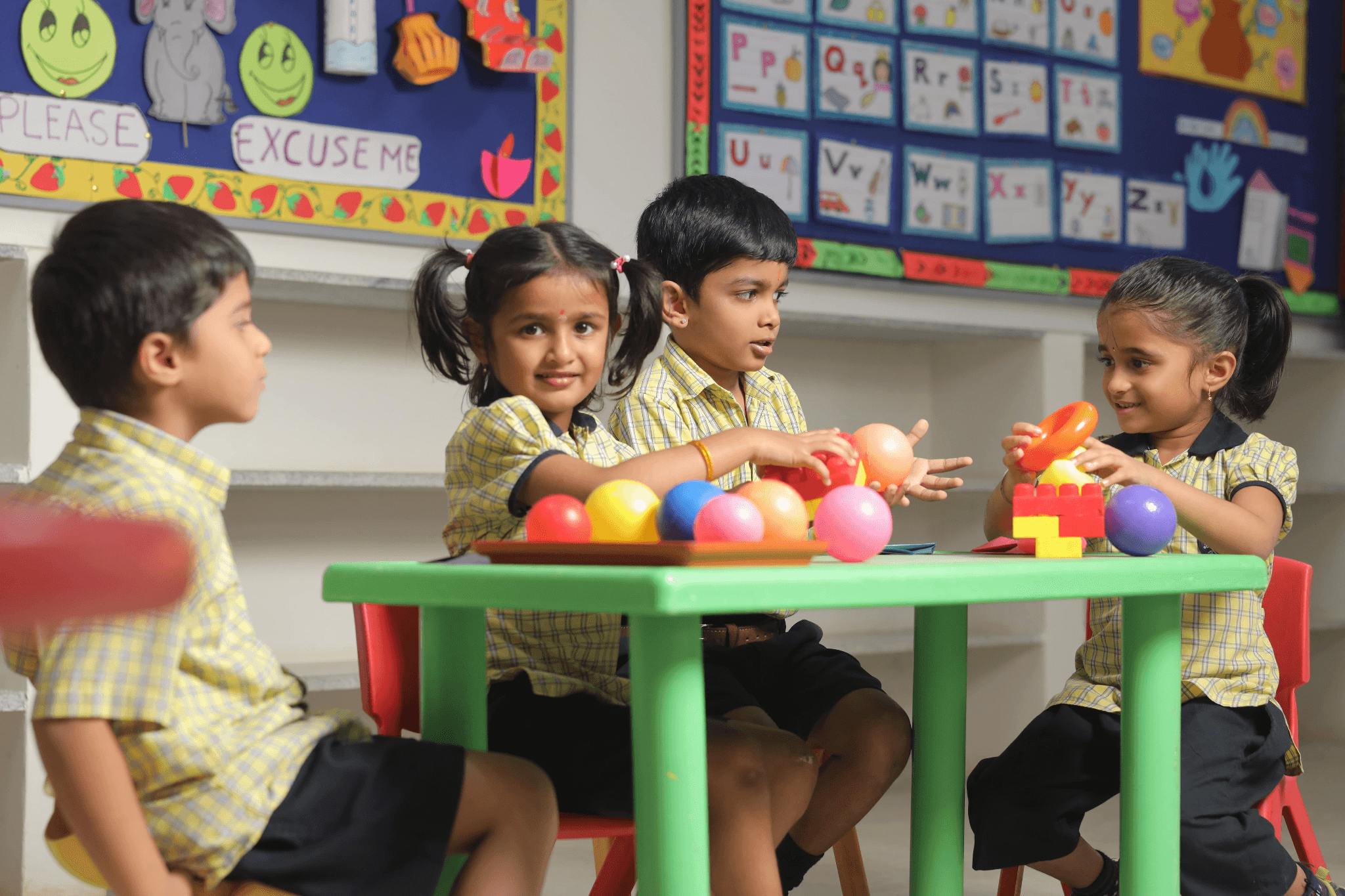Why the Best Play Schools in India Focus on Learning through Play
Children are naturally curious, creative, and full of energy. The best play schools in India recognize this and use play as a powerful tool for learning. Instead of rigid academic instruction, these schools allow children to explore, imagine, and discover the world around them. But why is play such a vital aspect of early childhood education?
Play is not just about fun. It’s about learning essential life skills like problem-solving, communication, and emotional resilience. When children play, they develop cognitive, social, and motor skills that serve as the foundation for lifelong learning. This is why the best play schools in India prioritize a play-based curriculum.
In this article, we explore the science behind play-based learning, its benefits, and how it prepares children for academic success and life beyond the classroom.
What Makes the Best Play Schools in India Stand Out?
The best play schools in India go beyond academics, focusing on holistic child development. They create a nurturing environment where play becomes the primary tool for learning.
Key Features of the Best Play Schools:
Play-Based Curriculum: Activities like storytelling, art, music, and role-play encourage natural learning.
Safe and Stimulating Environment: Child-friendly furniture, vibrant classrooms, and safe play zones.
Focus on Emotional Well-Being: Mindfulness activities, empathy development, and emotional support.
Qualified, Trained Teachers: Educators trained in child psychology and early childhood education.
Personalized Learning: Every child learns at their own pace, and teachers support this individual growth.
These elements create an environment where children feel safe, happy, and ready to learn through play.
Why Do Play Schools Focus on Learning Through Play?
The reason is simple: Children learn best when they are having fun. Play-based learning allows children to explore new concepts in a hands-on, enjoyable way, making the experience memorable.
Here’s Why Learning Through Play Matters:
Engagement: Children are naturally more engaged when they’re doing something fun.
Creativity & Imagination: Play encourages creativity, helping children think beyond limits.
Problem-Solving Skills: When children face challenges during play, they learn to solve problems.
Language Development: Role-play and storytelling introduce children to new words and ideas.
Emotional Development: Children learn to handle frustration, take turns, and share with peers.
Through play, children absorb concepts without even realizing they are learning, making it an organic and stress-free experience.
How Play-Based Learning Supports Early Childhood Development
Children’s brains are like sponges during their formative years. The best play schools in India understand this and use play to support cognitive, emotional, social, and physical development.
Cognitive Development
Play enhances problem-solving, decision-making, and critical thinking. Games like puzzles, memory cards, and building blocks challenge children's intellect and help them develop logical reasoning.
Example Activities:
- Solving puzzles to develop spatial awareness.
- Playing matching games to enhance memory and attention.
- Social & Emotional Development
- Interacting with other children during play teaches kids about empathy, patience, and teamwork. Role-play scenarios, such as “playing house” or “pretend school,” help children understand emotions and relationships.
Example Activities:
- Group activities where children take turns or share toys.
- Role-playing situations like shopping or doctor visits, which encourage social interaction.
- Physical Development
- Active play builds physical strength, coordination, and fine motor skills. Activities like running, jumping, climbing, and dancing help children develop muscle control and body balance.
Example Activities:
- Climbing on jungle gyms to build strength and balance.
- Art and craft activities like drawing, coloring, and cutting with scissors to enhance fine motor skills.
- Language & Communication Skills
- When children play, they talk, ask questions, and share ideas. Activities like storytelling and singing songs introduce children to new words, improving their vocabulary and communication skills.
Example Activities:
- Singing nursery rhymes to develop phonetic awareness.
- Storytelling sessions where children are encouraged to retell the story in their own words.
Types of Play Activities Used in the Best Play Schools
The best play schools in India use a variety of play types to engage children. Each type of play serves a unique purpose in child development.
1. Free Play (Unstructured Play)
Children are free to choose what they want to do, encouraging independence and creativity.
Examples:
Building with LEGO or wooden blocks.
Creating art with paints, crayons, and craft materials.
2. Guided Play (Teacher-Led Activities)
Teachers guide children through specific activities to achieve learning outcomes.
Examples:
Matching colors and shapes during a group activity.
Nature walks where children are asked to observe and identify objects like leaves, flowers, or insects.
3. Imaginative Play (Role-Play)
Children pretend to be someone or something else, helping them understand different roles in society.
Examples:
Playing “doctor and patient” in the playroom.
Acting as chefs in a pretend kitchen.
4. Sensory Play (Tactile Play)
This type of play engages the senses — touch, sight, sound, smell, and taste — to stimulate cognitive development.
Examples:
Playing with sand, water, and clay.
Sensory bins filled with rice, beans, or pom-poms for exploration.
How Play Prepares Children for School and Beyond
The ultimate goal of play-based learning is to prepare children for formal education and life beyond school. Here’s how it benefits them in the long term:
1. Builds Self-Confidence: Children learn to make decisions, take risks, and overcome challenges through play.
2. Encourages Independence: By allowing children to make choices during play, they develop autonomy.
3. Develops a Love for Learning: When learning is fun, children become lifelong learners.
4. Boosts Problem-Solving Skills: Play teaches children to tackle challenges, a skill needed throughout life.
5. Enhances Adaptability: Children learn to adapt to new rules, roles, and environments.
With these skills, children are better equipped to excel academically and socially.
What Should Parents Look for in the Best Play Schools in India?
Choosing the right play school for your child is an important decision. Here’s what parents should look for when evaluating play schools:
1. Safe & Child-Friendly Environment
Does the school have a secure campus?
Are the classrooms bright, clean, and stimulating?
2. Teacher Qualifications & Training
Are teachers certified in early childhood education?
Do they have experience in managing young children?
3. Play-Based Curriculum
Does the school have a balanced mix of free play, guided play, and imaginative play?
Are learning objectives integrated into playful activities?
4. Student-Teacher Ratio
Does the school have a low student-teacher ratio for personalized attention?
5. Holistic Development Approach
Does the school promote physical, cognitive, social, and emotional development?
Why SSRVM is Among the Best Play Schools in India
Sri Sri Ravishankar Vidya Mandir (SSRVM) is renowned for its holistic education approach. Here’s why parents trust SSRVM as one of the best play schools in India:
Play-Based Curriculum: Every child is encouraged to explore, imagine, and create.
Focus on Emotional Well-Being: Daily meditation, breathing exercises, and emotional support for children.
Trained Educators: Teachers are trained in child development and early learning methodologies.
Safe & Stimulating Spaces: Colorful classrooms, sensory play areas, and outdoor play zones.
Personalized Learning: Teachers recognize that each child is unique, and they support individual growth.
SSRVM’s value-based education system ensures that children are not only prepared for school but also for life.
FAQs
1. Why do the best play schools in India focus on learning through play?
Ans - Learning through play fosters cognitive, emotional, and social development. It encourages creativity, curiosity, and problem-solving, all of which are crucial for early development.
2. How does play-based learning help children?
Ans - It improves problem-solving, communication, social skills, and emotional well-being.
3. What should parents look for in a play school?
Ans - Look for a play-based curriculum, safe facilities, trained teachers, and a low student-teacher ratio.
4. Is SSRVM one of the best play schools in India?
Ans - Yes, SSRVM follows a holistic, value-based education system that prioritizes play-based learning.
Conclusion
The best play schools in India are redefining early childhood education by focusing on learning through play. By prioritizing creativity, emotional development, and social skills, these schools ensure children are ready for formal education and life beyond. If you’re looking for a nurturing, play-based school, consider Sri Sri Ravishankar Vidya Mandir (SSRVM) for your child’s early learning journey.

